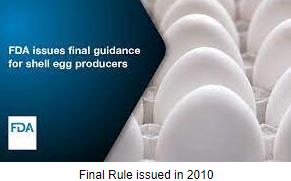 A December 15th 2023, warning letter to the Iowa Egg Company located in Osage, IA. confirmed a wide range of deficiencies in conforming to the FDA Final Rule on Salmonella. Effectively product is technically “adulterated” under section 402 (a) (4) of the Federal Food Drug and Cosmetic Act Section 21 U.S.C. 342 (a) (4) as potentially injurious to health.
A December 15th 2023, warning letter to the Iowa Egg Company located in Osage, IA. confirmed a wide range of deficiencies in conforming to the FDA Final Rule on Salmonella. Effectively product is technically “adulterated” under section 402 (a) (4) of the Federal Food Drug and Cosmetic Act Section 21 U.S.C. 342 (a) (4) as potentially injurious to health.
The warning letter followed issue of a FDA Form 483 following a June 2023 inspection of the complex by the Iowa Department of Agriculture, acting on behalf of the FDA.
The warning letter was issued since the company did not respond within the statutory period acknowledging deficiencies and providing an action program for remediation.
Defects noted by the Iowa Department of Agriculture included:
- Failure to have available a written Salmonella Enteritidis Prevention Plan as required.
- Failure to document that pullets were monitored for SE prior to transfer.
- Failure to maintain an acceptable program to suppress rodents and flies and evident structural defects allowing entry of rodents.
- Failure to document or implement appropriate holding temperatures for eggs.
- Failure to comply with required ages for drag-swab screening of flocks for environmental SE contamination.
- Failure to register a farm as required.
The delay between the FDA Form 483 in June 2023 and the warning letter in mid-December raises questions of timing in the response to obvious public health-related issues. Given the date of the original report documenting multiple defects relating to testing and other requirements, the FDA was negligent in waiting 21 weeks before issuing a warning letter. Had flocks on the operation been infected with SE, product would have been released  to the market with the potential for human infection. Any egg-borne outbreak of SE results in degradation of the image of the egg industry indirectly affecting all compliant farms.
to the market with the potential for human infection. Any egg-borne outbreak of SE results in degradation of the image of the egg industry indirectly affecting all compliant farms.
If the FDA is sincerely interested in protecting the food supply then a 21-week delay in follow-up is unacceptable. This situation appears to be a replay of the infant formula crisis but on a much smaller scale. Failure by the FDA to inspect major production facilities and a lack of response to evident problems of contamination led to a debacle characterized by a shortage of product with economic, political and social implications. It remains to be seen whether organizational changes at the FDA will improve concern within the Agency for food-related risks.